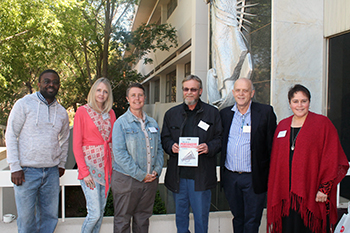Latest News Archive
Please select Category, Year, and then Month to display items
10 March 2022
|
Story Anthony Mthembu
|
Photo Unsplash
 The No Student Hungry team gearing up to start distributing food parcels to the selected students.
The No Student Hungry team gearing up to start distributing food parcels to the selected students.
The UFS is one of the many institutions of higher learning where food insecurity is an active issue. However, the
No Student Hungry Programme is one of the initiatives launched at the university to assist in fighting food insecurity at the institution.
The purpose of the programme
Since its inception in 2011, the initiative has assisted many students in acquiring a healthy meal. Additionally, the Food Environment Office also hands out food packages, so that students can continue to achieve academically. “We are trying to develop a healthy environment for students and make it easier for them to have a nice and healthy meal,” stated Annelize Visagie, who heads the Food Environment Office at the UFS. The Food Environment programme is spread out on all three campuses, each with its own facilitators. Furthermore, the programme mainly caters for students who are not funded by the National Student Financial Aid Scheme (NSFAS) but who are excelling academically. The abovementioned students apply for assistance online, and a list is then drawn up of students who receive assistance for the year.
Alternative solutions to keep the initiative running
On the Bloemfontein Campus, the No Student Hungry Programme will be catering for 200 students in the 2022 academic year, assisting them with a daily nutritious meal. Additional food parcels are also handed out to provide further assistance. “We give food parcels to the students on the list every Tuesday and Thursday at the Thakaneng Bridge,” Visagie highlighted. However, she argues that catering for the student population through this programme can be a challenge, as the demand for assistance is growing rapidly and the ability to assist is limited. The programme relies on partnerships and sponsors to assist the student body. In fact, the coordinators of the programme currently have a memorandum of understanding with Tiger Brands according to which they deliver around 100 food parcels for distribution.
In addition, the coordinators have put in place alternative measures to ensure that they can provide more food to students. “The
Kovsie Act Office, in partnership with the
Department of Sustainable Food Systems and Development, has started a food garden where healthy and nutritious produce are grown, in order to add value to the distribution,” she indicated. Although the programme can only assist to a point, students who are in desperate need of assistance are never turned away. In fact, the
Social Support Unit at Thakaneng Bridge usually assists students with food vouchers for a maximum of four days.
A commitment to teaching healthy eating habits
The programme is not only committed to curbing food insecurity, but also to ensuring that students have a healthy and balanced diet. As such, a booklet is being issued by the
Department of Nutrition and Dietetics in collaboration with the Department of Sustainable Food Systems and Development, which contains ways in which students can make a healthy meal using some of the ingredients offered in the food parcels.
“We want to teach students how to eat healthy in the cheapest way, because they don’t have a lot of money to buy expensive food products,” Visagie argued.
International delegates attend SACOMM conference at UFS
2016-10-12

From the left: Prof Colin Chasi, Chairperson of the
South African Communications Association,
Dr Dalme Mulder UFS Lecturer; Dr Wilmien Marais,
UFS Lecturer; Prof Johann de Wet, former head of
UFS Department of Communication Science
Prof Tom O’Regan, University of Queensland (Australia)
and Prof Milli Rivera, Head of the UFS Department of
Communication Science during the conference on the
UFS Bloemfontein Campus.
Photo: Rulanzen Martin
Communication from within and below: Social Transformation and Inclusiveness. That was the theme of the 2016 South African Communication Association (SACOMM) conference, hosted at the Bloemfontein Campus of the University of the Free State (UFS) from 3 to 5 October 2016.
“Through this theme, participants were invited to submit papers that examined the role of communication in today’s tumultuous climate,” said Prof Mili Rivera, Head of the Department of Communication Science at the UFS.
A total of 140 delegates from other South African universities, as well as international delegates from Zimbabwe, Nigeria, the United Kingdom, United States, and Australia attended the conference. It was the second time in ten years that the UFS hosted the conference.
Organisation to mentor and support emerging scholars
Various staff members and students from the UFS Department of Communication Science presented papers during the three days.
Annette van Baalen and Dr Dalme Mulder, both lecturers in the department, won the best paper award in the Corporate Communication division. A number of emerging scholars also presented papers. “The organisation is committed to mentoring and supporting emerging scholars in the field of Communication Science,” said Prof Rivera.
Association must be agent of change in curriculum
Delegates discussed the role of the organisation (SACOMM) as an agent of change in terms of decolonising the curriculum. The focus was on training journalists to cover crises in a fair and balanced manner. The book The Art of Persuasive Communication - A Process (4th Edition) by Prof Johann de Wet, former head of the UFS Department of Communication Science, was also launched during the conference.
The next SACOMM conference will take place at Rhodes University in 2017.